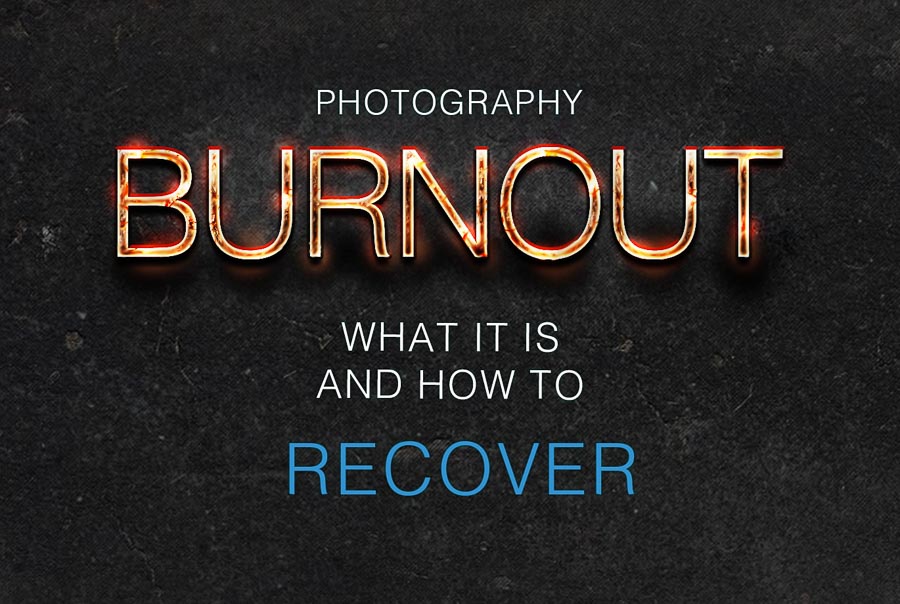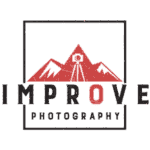
Ironically, the love for photography can cause you to experience burnout sooner because it can get to the point where it seems your life is revolving around photography. I have found myself in that situation a few times, and maybe you have as well. This article will tell you a little about the causes of burnout and give you some ways you can recover.
Stress
Seldom do the signs of burnout reveal themselves gradually. If they do, they tend to be ignored because you are so focused on other activities.
Burnout is caused by being in a constant state of stress. That word—stress—has a negative connotation. However, psychologists classify stress as both positive and negative, based largely on how we feel about them.
Positive stress is caused by things that we generally feel are in our control Positive stress usually invigorates us and excites us. It can increase performance, is short-term, and focuses energy. Imagine you are planning a vacation. You are excited about it, and you love planning it, working out the details, figuring out where to stay, etc. You may even get more done at work because you want to make sure you won't be bothered by work while on vacation. This is an example of positive stress.
Negative stress is what most of us think about when we think of “stress.” Negative stress usually causes anxiety; it is perceived as outside our ability to cope, feels unpleasant, and can lead to mental and physical problems. Some examples include the death of a loved one, a divorce, financial problems, or your child's problems in school.
So all of us feel stress—both positive and negative—every day. Usually, there is some relief from it in our daily lives. Sometimes, though, there is no relief from stress for several days (or even weeks) at a time. This is when burnout occurs.
Signs of Burnout
Burnout leads to feelings of physical and emotional exhaustion, feelings of detachment, and feelings of inadequacy. Each of these can hurt your photography in different ways.
Physical and Emotional Exhaustion
Exhaustion is more than simply feeling tired or fatigued. Exhaustion can manifest as a weakened immune system, leading to increased illnesses, forgetfulness, loss of appetite, anxiety, anger, and/or depression. I think it is obvious how each of these impact your photography.
Although it may not seem like it at first blush, photography can be physically demanding. You may have to walk or hike some distance to get the shot you want. You may have to get up early for that sunrise shot or stay out late to get that photo of the Milky Way. Wedding photographers are constantly on the go all day long. Physical exhaustion can therefore really impact your photography, whether it is a hobby or your profession.
The same can be said for emotional exhaustion. Most photography evokes some emotion. It is difficult to do this when all you are feeling is numb. Feelings of apathy will show in your photographs.
Cynicism and Detachment
These signs are what I personally associate with burnout. Loss of enjoyment in photography is usually what I first notice. This is accompanied by pessimism, feeling as if my skills will never improve. Burnout can cause you to experience detachment—feeling disconnected from others. You may miss your photo club meetings, stop returning emails, stop visiting the Improve Photography Podcast Listeners Facebook Group, or pull away from other activities. This is ironic because one of the things that helps, at least for me, is to become more involved in groups to which I belong.
Ineffectiveness and Lack of Accomplishment
It can seem that no matter how hard you work at photography, you never see your skills improving. You can develop feelings of hopelessness because of this, even though your photography is developing (no pun intended) at the same rate as before.
This often makes you irritable, or at least it does for me. Again, this is where burnout makes it hard to recover because you can sometimes drive away the very people you need to help you.
All of these feelings combine to make you less productive, and even though the burnout may have started in photography, it can spill over into other aspects of our lives, such as family relationships and jobs (for us non-professional photographers).
Is Burnout a Symptom of a Larger Problem?
The first step in recovering from a problem is recognizing that there is one. While it is normal for everyone to feel burnout from time to time, if it becomes a recurring problem for you, then you should visit your doctor.
Burnout may not be the problem. It may be merely a symptom of a larger problem. Many of the signs and symptoms of burnout are also the signs and symptoms of depression. Repeated bouts of burnout may not be burnout at all, but may be signs that you are suffering from depression. If this is the case, you should seek treatment before the problem becomes much more severe.
Recovering from Burnout
Once you have identified you are suffering from burnout, there are some simple steps you can take to help speed your recovery.
Examine Your General Health
Take an honest look at your health. Basically, anything that can affect your ability to tolerate stress can make you more or less prone to burnout.
Exercise helps combat burnout in two ways. First, exercise can increase your stamina and endurance, thus combatting burnout's ability to make you feel exhausted. Secondly, exercise can help create endorphins and other chemicals in your body that help fight feelings of stress.
We all know the importance of eating healthy. Anyone who has experienced a mid-afternoon crash following a carb-heavy lunch knows just how much the food you eat can affect your performance.
Although many people think photography is just “pushing a button,” we all know better. You may be constantly moving equipment, lugging around heavy cameras and lenses, or contorting your body to get just that unusual angle for the shot you want. You need to make sure the fuel you put into your body is a good for it. And don't forget to stay hydrated, either!
Learn to Say “No.”
For a new professional photographer, it is hard to turn down a potential job. After all, that job represents your ability to provide for yourself and your family.
For a hobbyist like myself, it can be hard to turn down opportunities to take some photos, whether it's a chance to freelance for the local paper or something like a group photo walk down a nature trail.
Each one of these things, though, represent stress because they demand our most limited resource—time. It is only natural that you will feel more stress as the demands on your time increase.
This is a lesson I have learned the hard way. I recently began freelancing with my local newspaper during school graduations. For about a month, my Friday and Saturday nights were filled with photographing high school graduations, running home, and hurriedly processing the images to meet a deadline that was only two hours after the ceremony began.
The stress of covering the graduations led me to dread the weekends. I have since learned to limit myself, and next year I will be sure to not accept so many assignments.
Limit Your Focus
Projects
If you ask most new photographers what they enjoy photographing, they will tell you “everything.” Many photographers, both amateur and hobbyists, take this approach when deciding what to photograph. They will commit to any project regardless of the subject. It's photography, so it has to be fun, right?
No, it doesn't. A new photographer will quickly learn the types of photography they enjoy and don't enjoy. Quite simply, if you know you aren't going to enjoy a project, you should not do it. That is stress you don't need. (Obviously, there are exceptions to this, but you will have to decide what they are for yourself.)
Equipment

I see many photographers in Facebook groups and online forums stressing over what lens is the best, what flash they should get, etc. Although it's a cliché, “the best camera (lens, flash, etc.) is the one you have.”
I'm not suggesting that you try to get over gear lust. Suggesting a photographer gets over gear lust is about like suggesting a fish gets over swimming. However, there is a sense of peace that comes over you when you realize that equipment is not limiting you nearly as much as your attitude does.
This is such a freeing feeling, that I urge you to choose just one lens (preferably prime) and shoot with only it for a week or two. While the idea seems stressful, after a day or two it will actually relieve stress because you are no longer focusing on equipment but instead focusing on composition.
Alternatively, you may want to put away the “real camera” for a while and only use your phone camera. Your phone is probably with you all the time anyway, so this way, you do not have to remember to bring your camera with you. I think some of my best photographs have come when I have limited myself to using my iPhone's camera instead of carrying my DSLR. Plus, face it, it is lighter and easier to carry.
Time
“Work/life balance” is a popular phrase at the moment. I suggest that for many photographers, including myself, their photography/life balance is not very balanced at all. This imbalance can contribute to burnout.
When I become interested in a subject, such as photography, I become obsessed with it, and spend as many of my waking hours working on that subject as possible. From what I have read in the Improve Photography Facebook group, many of you are like that as well. If you are, it is far too easy to let photography take over your life.
Simply setting a limit on how much time you will spend on photography can remove some stress. In a way, this goes back to learning to say, “No,” except it is directed at yourself instead of someone else. Parent must often set limits on their child or the child will spend too much time, for example, playing video games. We adults are sometimes like children in that we can spend too much time on an enjoyable activity and neglect other things. Placing a limit on photography can help you get your life back into balance.
In my case, I'm taking part in a 365 Project, and I'm freelancing for the local paper. I've had a family member ask me to shoot her wedding, and I'm shooting some portraits on the side. This, on top of the demands caused by my family and job, have caused me to feel some burnout. I've had to place some limits on how much time I will devote to photography.
Ask Yourself Why
If you are feeling burned out with photography, it helps to ask yourself why you are taking the pictures you are taking. At the very least, this will help you see what methods of “treatment” are available to you. For example, if you are a professional photographer, you likely cannot take a break from photography without suffering financially.
If you are a hobbyist, asking yourself why you want to practice photography has at least two benefits. First, it will help you recognize if you simply are practicing the wrong sort of photography. As strange as it sounds, you may not realize that the type of photography you practice may be totally wrong for you.
For example, you may be practicing product shots of jewelry. This type of photography is quite detail oriented. If you are the “big picture” kind of person, focusing on minor details may be irritating to you. Yet, if you are technically good at it and produce good photos, the satisfaction at your technical proficiency may obscure the feelings of frustration, and you may not even realize that practicing such shots are actually a source of stress.
Another benefit of asking, “Why?” is that it makes you focus on your end goal. Going back to my personal example of freelancing with the local paper, I asked myself why I accepted so many graduation photos. I enjoyed it, but I realized the small amount I was paid for it was not worth the stress of meeting a deadline. While my goal was to make money with my photography, that goal could be better suited elsewhere, such as practicing portraiture.
Try Something New
Sometimes what you feel as burnout is actually just complacency because you are not creatively challenged. In such a case, doing something new can help you.
It may be as simple as making one small change. If you like photographing portraits, try switching to more of a lifestyle shot and take portraits of people in their homes, or take environmental portraits of them at their jobs.
It can help to branch into a new genre of photography, but one that has elements that appeal to you. For example, sports photographers may like to try street photography because the aspect of taking unposed photos of people may be attractive to them. One of the aspect of portraiture that I love is lighting. Food photography is another genre where lighting can totally change the mood of a photo, and I have found it refreshing to practice that genre from time to time.
Maybe you need to start a photo project. I have heard many professional photographers say that starting a new photo project has helped them. They experience burnout taking the same style of photos time after time. Yet taking photos that have personal meaning for them can help re-light their creative fire. A personal project, even if it is totally unrelated to your professional work, can introduce new creative aspects into your paid photography.
Take a Break
This obviously is not something that a professional photographer can do, and least not for long. Nevertheless, sometimes, all that can help is taking a break from photography.
You can get tired and frustrated with any activity that is repeated over and over. Photography is no different. Just as taking a long weekend can help re-energize a 9-5 job, I have found that some of my best creative ideas came to me when I am taking a break from photography.
Get Another Opinion
Perhaps your burnout comes from feeling like your photography isn't as good as you think it should be. We are all our own worst critics. In such a situation, getting a blind critique can help. At worst, you will realize some areas in which you need improvement. At best, you'll find out that you have been criticizing your own work too harshly.
Photography Will be Here
You may feel burned out, and you may need to put the camera down for a little while. That's ok. The camera will be here for you when you get back. Remember, you cannot take any photos if you don't take care of yourself first. You—the photographer—are the most important part of your photography, so take care of yourself.

Great article Tim!
I am in a burnout mode right now. I have been learning photography for the past 4 years and have it a wall. I have quit listening to podcast, quit taking pictures, and quit buying gear. I’m glad I decided to read this article, lately I might have just looked at the email and deleted it without much thought. Maybe there’s still something left. I’m going to take a few of your suggestions and see if I can’t try to create that joy I use to get from photography.
I’ve been there, Brad, but I keep coming back. For me, being a hobbyist, taking a break has helped more than anything. Usually, a few days is all it takes for me. Then, I’ll see something that catches my eye, and that’s enough to reignite the flame.
Thank you for this article – very timely!
I am not a Photographer. I am a data recovery specialist and cater to lots of requirement regarding data loss and recovery. I stumbled upon this article and felt I can also quite relate to it. I used to recover photos, emails, hard drive data, etc. but now I feel I have burnt out and nothing left it me to explore further. Thanks for the amazing tricks to recover! I will follow it!
I am definitely experiencing this. I’m a professional commercial photographer, having made my living doing only this for nearly 20 years. I find myself isolating more and more and having a total lack of interest in it. For me, part of it is being in high demand, for what I produce rather than who I am. Since images are of people or their products or their projects, that is all folks care about. I feel like I’m enabling narcissism and materialism. There is a growing sense of detachment.
It is not an easy career path, for sure!
Thanks for your article.
Sell your camera and be done with it !